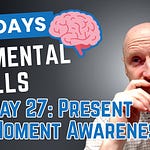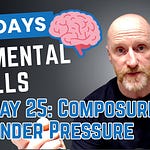Did you know that referring to yourself by your first name or as "you" (instead of "I" or “my“ or “me”) may help you step back from challenging situations and see things more clearly? Studies have shown that it gives you emotional and psychological distance. For example, after a difficult encounter, I might think to myself, “That was a stressful situation, I really felt under pressure, and I thought I’d never get out of there, but I did, and I’m glad that’s over.” Instead, I might say, “That was a stressful situation, you really felt under pressure, and you thought you’d never get out of there, but you did, and you’re glad that’s over.”
In the first case, I’m reliving it in my mind, and as I speak about it, referring to myself as I, I recall the emotional state—I experience it again. In the second case, it’s like I have become a passive, non-judgmental observer commenting on the experience of another. In some ways, that’s true, because the event in time has gone, and that person is gone too. Or rather, I have left them behind, and I am in the present here and now, not in the past. Think about a negative experience. Write it down in the first person, then write it again from a non-first-person perspective. Can you feel the difference?
You feel something qualitatively different when referring to yourself in the first person compared to referring to yourself in the non-first person. In the first person, you and the feeling are one—you are it and it is you. You refer to your anxiety, your depression, and your feelings, and you own them. But what if you created some space between the feeling or emotional state and what you refer to as you? What if the you to which you refer is, in fact, something that can observe the situation in which you found yourself?
“One thing I didn’t want to do was make an emotional decision. I wanted to do what’s best for LeBron James and to do what makes LeBron James happy.”
This quote by LeBron James from 2010 was controversial. Many thought he was losing his mind. However, he was simply applying this principle to his decision-making process and self-reflection. You may not want to engage in this method out loud, but you can do so in your own mind. It may help you stay rooted in the present, observing a past event.
A study by Kross et al. in 20141 examined the way people talk to themselves in their minds and how it influences their handling of stressful social situations and social anxiety. They conducted seven studies involving a total of 585 people. They found that those who used their name or "you" in their self-talk did better in creating first impressions and in public speaking (according to outside observers) and felt less stressed. They also didn’t dwell on the event negatively afterwards.
Two further studies by Kross et al. looked at how this kind of non-first-person self-talk changes how people view anxiety-provoking situations. Using their name or "you" made people see future stressful events as more of a challenge and less of a threat—remember our session on Growth and Fixed Mindset? Finally, the researchers combined all the results and found that these benefits occurred regardless of whether someone had social anxiety, meaning this method of self-regulation could help almost anyone manage challenging situations and engage proactively in self-reflection.
What about the execution of skills?
When it comes to executing skills in sport, self-talk can help with preparation and focus. When you're doing precise tasks, like taking a free (let’s take hurling, our national sport in Ireland), talking yourself through your process helps. It’s called instructional self-talk. For example, before taking a free, see yourself perform it perfectly and talk yourself through each aspect; "ok, deep breath, exhale. Approach the ball, clean lift, smooth movement, step into the strike, strike and watch it sail over the bar. Research shows that this works better than just trying to pump yourself up with motivational self-talk, like "let’s go, you're the man" etc. Giving yourself instructions is especially beneficial for fine motor skills, much more so than for larger gross movements.
Self-talk is essentially about focusing your thoughts to guide your actions, acting as an internal instruction for what you want to do (Johnson et al., 2004)2. This mental strategy enhances performance in several ways: it helps you sharpen your focus and direct your attention to crucial cues (Landin, 19943; Nideffer, 19934), allows you to regulate your effort and boost your self-confidence (Zinnser et al., 20065), and can even be effective in managing anxiety and prompting the correct response in the moment (Hardy et al., 19966).
Mental Skills Basics Course
Suffering stress and anxiety is not a prerequisite for success in self-employment–there's a better way. Mental skills provide you with the means of coping effectively with difficulty and achieving your goals. I created the Mental Skills Basics Course to introduce business leaders, self-employed individuals, freelancers, consultants, and small business owners to the psychological and emotional skills associated with success.
Kross, E., Bruehlman-Senecal, E., Park, J., Burson, A., Dougherty, A., Shablack, H., ... & Ayduk, O. (2014). Self-talk as a regulatory mechanism: how you do it matters. Journal of personality and social psychology, 106(2), 304.
Johnson, J. J., Hrycaiko, D. W., Johnson, G. V., & Halas, J. M. (2004). Self-talk and female youth soccer performance. The sport psychologist, 18(1), 44-59.
Landin, D. (1994). The role of verbal cues in skill learning. Quest, 46(3), 299-313.
Nideffer, R. (1993). Attention control training. In R. N. Singer, M. Murphey, & I. K. Tennant (Eds.), Handbook of research on sport psychology (pp. 127–170). New York: Macmillan.
Zinnser, N., Bunker, L., & Williams, J. M. (2006). Cognitive techniques for building confidence and enhancing performance. In J. M. Williams (Ed.), Applied sport psychology: Personal growth to peak performance (5th ed.) (pp. 349–381)
Hardy, L., Jones, G., & Gould, D. (2018). Understanding psychological preparation for sport: Theory and practice of elite performers. John Wiley & Sons.










